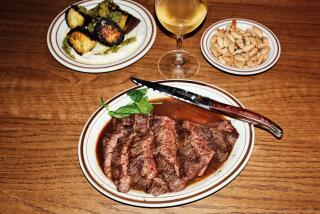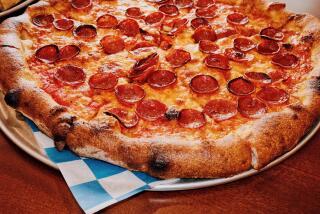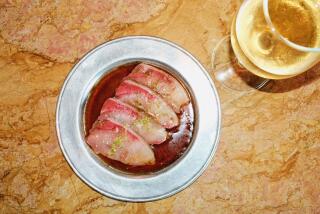Sky’s the limit at high-flying Kumo
IN the mood to swan through a chic, new sushi restaurant and unburden yourself of a good chunk of change? But, here’s the hitch, you’re not very hungry. Have I got the restaurant for you.
Kumo Restaurant in West Hollywood has all the requisite elements to attract a trendy crowd -- art-directed décor, good-looking waiters, experienced sushi chefs at the ready, and a kitchen that turns out the Japanese fusion that made Koi and the original Matsuhisa such mega hits.
The address on the corner of Melrose and Orlando avenues has been home to a number of restaurants, most recently Citrine, but you’d never recognize it now. From the outside, Kumo is white white white -- the name, after all, means “cloud” in Japanese. The facade’s gleaming white vertical elements look something like radiator fins and give it a futuristic spin. Inside, the dining room and bar are just as blindingly white. A dropped ceiling traces the curves of cloud-like formations. Chandeliers with blown-glass champagne bubbles add a whimsical note. Banquettes and booths are white leather, the tabletops gleaming white enamel. The whole effect is curiously soothing.
I can’t help thinking that if heaven has a sushi restaurant, it might look a little like this -- and a little bit like a set from Albert Brooks’ 1991 film “Defending Your Life.” White robes would not be inappropriate, but most people are in black. As stunning as it is, the design does have a few glitches, most notably the chrome table bases underfoot.
The one note of color is a five-panel video screen mounted above the sushi bar that plays a mesmerizing animated film called “City Glow” by Japanese artist Chiho Aoshima. I’ve never seen the seven-minute loop all the way through, just discrete snippets of brilliant color, leaves of gorgeous plants slowly filling the screen, then vanishing. Rain appears, a wind blows through. The film adds a mysterious beauty to the dining room. And what better space to display it than this restaurant with sushi fanciers to enjoy it at both lunch and dinner. Its colors wash the room with a happy spirit.
Kumo comes to us courtesy of Michael Ovitz, the former über-agent and Disney exec who made his first venture into the restaurant business with Hamasaku in Los Angeles. His chef of seven years there, Hiro Fujita, is the chef here. You could say Fujita got a very big promotion -- from strip mall sushi restaurant to one smack in the middle of the action.
The food comes and goes in brief snippets. The menu is so large, you end up choosing items randomly from categories such as cold appetizers and small plates (which runs to 25 selections) or house special rolls (more than a dozen selections). At least, you’ll never get bored. And that doesn’t include traditional sushi and sashimi, or cooked meat and fish appetizers and entrees. Everything is tricked out to the max, served on elegant white ceramics in all sorts of shapes. The share plates, in contrast, are rough-hewn and lovely, decorated with a swirl of blue and white glaze.
After you sample a few dishes, though, the thrill wears off. Nothing has much taste, and when it does, it’s mostly the sweet sauces, not the ingredient or seafood itself. The one exception among the more than a dozen items I tried was the black cod served in a red wine miso sauce, but then black cod is naturally fatty, and that’s where it gets its flavor. Which makes me wonder where the kitchen is buying the fish, because I’ve rarely had such tasteless sushi or other dishes at a high-end sushi restaurant. And Kumo is very high end.
Handsome actor/waiters are pleasant and accommodating. They’ll encourage you and your guests to share, talking up the Japanese tapas concept. But since portions of most dishes are so minuscule, sharing means a mere bite or two. In the end, you’ll have to order lots of dishes not to go away hungry. You’d think they could slip just a smidgen more fish or rice in without breaking the bank. But maybe Ovitz and company are smarter than we think. Limited quantities of anything makes it feel more precious.
Look to the special tsumami (Japanese version of tapas) for some of the more interesting-sounding dishes. However, the lineup on the separate specials menu hasn’t changed on my last three visits, so I guess they’re sort of regular “specials.” Hamachi (yellowtail) sashimi with radicchio and daikon salad is served in a yuzu sweet and sour sauce, heavy on the sweet and heavy on the amount of sauce, so the fish gets lost. Ravioli stuffed with snow crab and ricotta cheese adorn a salad of watercress with avocado and mango overdressed in an overwhelmingly perfumed vanilla vinaigrette, an example of a fusion dish gone over the top.
Flavor chaos
JAPANESE Jewish pizza (yes, that’s the name) is a rather small round of pizza dough heaped with four kinds of fish -- yellowtail, salmon, tuna sashimi and smoked black cod -- plus tomato, avocado and ricotta cheese with black miso sauce for a cacophony of flavors. What a silly idea. It’s like one of those awful sushi rolls made with every fish in the sushi case.
The kitchen tries valiantly to live up to the style-conscious décor but can’t always keep up. Take the ika, or squid. Julienned ribbons of squid sashimi and wonton skins arrive stuffed into a hollowed-out lemon with the lid askew. Or the tempura dessert of melon, mango, kiwi and strawberry fried in tempura batter and stuck on skewers into a vase like some demented flower arrangement.
The best dishes are the simplest. Excellent house-made pickles with a pleasant crunch arrive in a cedar box like the ones used for drinking sake. Boiled spinach is served in a tall mound showered with bonito flakes and vinegar. And sea urchin risotto is served, a scoop at a time, on ivory endive leaves for a lovely presentation. Uni here is pristine and delicious, the very best quality.
Another dish I liked is sautéed mixed mushrooms served in a high-sided ocher bowl. If only the kitchen would give up the forced theatrics and focus more on dishes like these, Kumo would be a better restaurant.
The sushi itself is ordinary. But if your tastes run to fancy sushi rolls, Kumo’s sushi chefs under the direction of executive sushi chef Haya Saito are ready to indulge you with a house special spicy popper that involves spicy tuna and avocado wrapped in pink soy paper and crowned with shrimp tempura and crab salad. Or the Kumo burrito, which houses spicy tuna, freshwater eel and crab in one package. Just watch out for that soggy tempura.
Though the more creative aspects involving squirt bottles and wild combinations of ingredients seems so cutting edge to the fashion-forward crowd, such excesses tend to bore anyone who really knows Japanese cuisine. But then connoisseurs are not the target audience; the food is meant to be lighthearted and fun. Still, the kitchen can surely do better than this.
A hefty tariff
IN the world of sushi restaurants, Kumo is not by any means the most expensive. Urasawa starts at $300 a person for omakase, or chef’s tasting menu, and in New York, Masa Takayama, formerly of Ginza Sushiko in Beverly Hills is charging upward of $400. But you’re getting something extraordinary for your money, whereas at Kumo, you’re paying a hefty tariff for a small amount of quite ordinary sushi and some Japanese-accented entrees.
For those who are more impressed by a restaurant’s ambience than its food, and don’t mind paying for the privilege of spending an evening in this stunning stage set, Kumo, like the Ivy, is reassuring. No question, but that you’ve got an au courant address and if you’re prepared to lay down a few grand for a purse, then I suppose $70 for a few bites of sushi will seem like chump change.
Rating: *
Location: 8360 Melrose Ave. (at Orlando Avenue), West Hollywood; (323) 651-5866.
Ambience: Chic white and chrome sushi restaurant as conceived by former über-agent Michael Ovitz to showcase Hiro Fujita’s fusion sushi cuisine. A fashionable crowd, fresh from shopping on Melrose Avenue.
Service: Friendly and efficient from mostly actor/waiters.
Price: First courses, $10 to $40; vegetables and sides, $4 to $14; fish and meat dishes, $10 to $28; special sashimi, $20; special rolls, $12 to $24; desserts, $10 to $16; dinner omakase (chef’s menu), $150 per person; lunch omakase, $50. Full bar. Valet parking, $5.50.
Best dishes: House-made pickles, sea urchin risotto, black cod in red wine miso sauce, spinach with bonito flakes, sautéed mixed mushrooms.
Wine list: Minimal. Corkage fee, $25.
Best table: One of the window booths.
Details: Open for lunch from 11:30 a.m. to 2:30 p.m. Monday through Friday, and for dinner from 6 to 11 p.m. Monday through Thursday, until midnight Friday and Saturday.
Rating is based on food, service and ambience, with price taken into account in relation to quality. ****: Outstanding on every level. ***: Excellent. **: Very good. *: Good. No star: Poor to satisfactory.
More to Read
Sign up for The Wild
We’ll help you find the best places to hike, bike and run, as well as the perfect silent spots for meditation and yoga.
You may occasionally receive promotional content from the Los Angeles Times.










